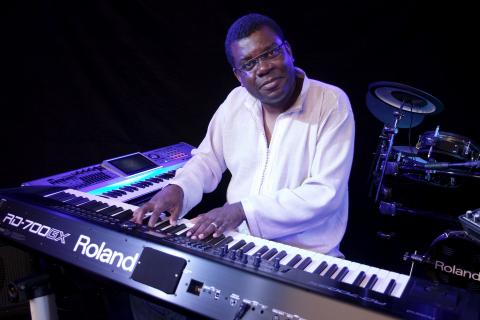Faculty Profile: Jetro Da Silva

Professor Jetro Da Silva
Al Dugas
Believe it or not, life-changing things can happen at the supermarket. That’s where a chance meeting with old friends prompted Professor Jetro Da Silva and his wife to found a church in East Greenwich, Rhode Island. The decision ultimately propelled them down a road that led Jetro to a graduate studies program at Andover Newton Theological Seminary. This September, Da Silva began his final year of theological studies. In May 2009, he’ll graduate with a master of arts degree. Meanwhile, he continues to teach in Berklee’s Ensemble Department, tour as the keyboardist for Whitney Houston’s band, develop his own online music school, and minister to his congregation at International Family Tabernacle Church, an American Baptist-affiliated multicultural Pentecostal congregation.
Born in Meier, Rio de Janeiro, Brazil, Da Silva played his first gig at 12 years old at a local Baptist church after only a month of piano lessons. By 14, he knew he wanted to become a musician. With a full scholarship, he pursued classical studies at Rio’s Escola Nacional de Música, and he performed with many renowned Brazilian artists before coming to Berklee where he studied music production and engineering.
Since 2001, Da Silva has taught in the Contemporary Writing Division and the Ensemble Department. His diverse course load includes a contemporary urban music writing class, an accompaniment workshop, and a jazz trio ensemble. In his classes, Da Silva considers his primary role to be that of a mentor to students, and he often shares lessons learned during his career working with such artists as Earth, Wind & Fire, Chaka Khan, Bonnie Raitt, Stevie Wonder, and many others.
“I try to boost the students so they will be equipped to go through what I went through,” he says. “I stress that if you get a call to work with Gladys Knight, someone has recognized your talent; you don’t need to audition while you are playing. Just play what’s needed for the gig. As both a mentor and as a minister, I always consider what my mindset should be. The word minister means to serve, and I do that onstage as well. My job is to please the singer, to make the singer comfortable, and to listen to the music director. These are all forms of serving.”
Marrying Music and Ministry
Da Silva believes that both ministry and music require compassion. “As a musician, you are exposed to so many human experiences,” he says. “You might play a funeral in the morning, a bar mitzvah in the afternoon, and then a club in the evening. To succeed, you need to be able to listen—not just to the music but to your fellow musicians as well. Being a musician will also teach you about compromise. On a three- or six-month tour, you’re on the bus more than you’re on stage. If I have to choose between being with a thorny virtuoso or someone who can get the parts right, is easy to work with, and can be developed, I choose the latter.”
Da Silva says that many of the broad concepts he teaches at Berklee also apply to his ministry. Just as a musician must communicate well with his or her fellow musicians in a band, so must a church leader know his congregants to properly shepherd them. “You can’t lead if you don’t know your community,” he says. “You have to put your ego aside and listen to folks and understand their needs. When you do that onstage, magical moments can happen.”
Thus, in class, his emphasis is on the development of both musical and interpersonal skills. “My goal is to see my students form bands outside of my classes. I want to help develop human beings who know how to be with other human beings.”
“Music is a language that words cannot speak,” he continues. “You can say so much with music that can’t be said in words. As musicians, we are in a privileged position to be able to impart great ideas and demonstrate through our music what compassion and communication can do. As a musician, I feel a responsibility to serve and share all that I have learned. Both music and ministry allow me to do that.”
Da Silva’s interest in personal growth was another motivation to seek additional education while continuing to teach. “I asked myself, ‘How can I help people be good students if I am not one myself’?” Since his first gig in Brazil as a preteen, church music has held a special place in his heart. Hence, his master’s thesis will focus on the music of the Old Testament. His ultimate goal is to bring some of this early music back into contemporary worship alongside Western music. His role model is Israel’s King David, who penned the psalms of the Old Testament. “He was a leader, a soldier, and a musician who built his own instruments. I want to be the King David of our day, exploring technology, theology, and music. We live in a time when we need to be involved in many areas. My goal is to lead by example in all of my pursuits.”
Susan Gedutis Lindsay is a freelance writer and editor and faculty member at Bridgewater State College.




